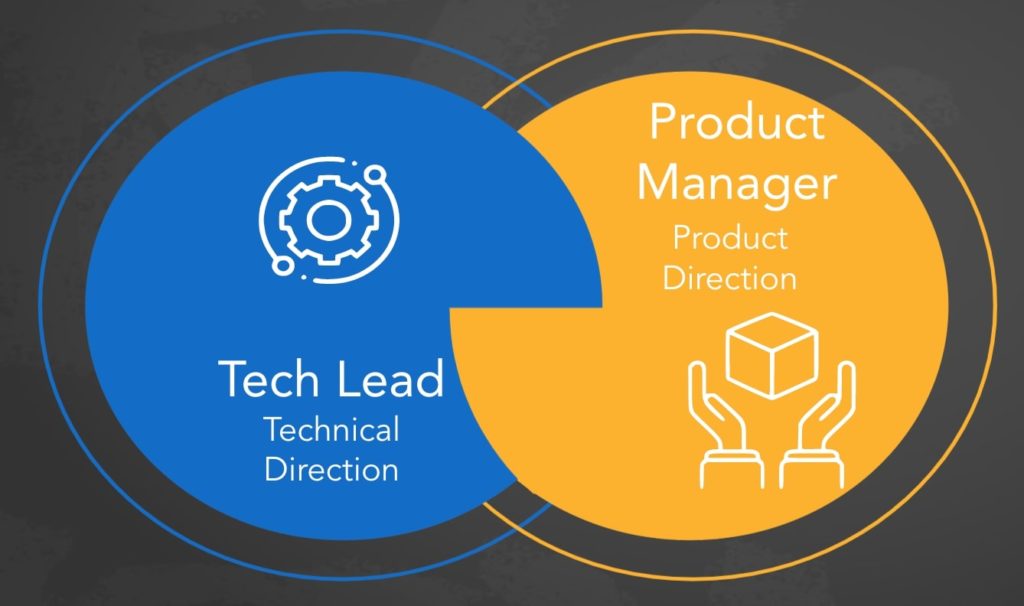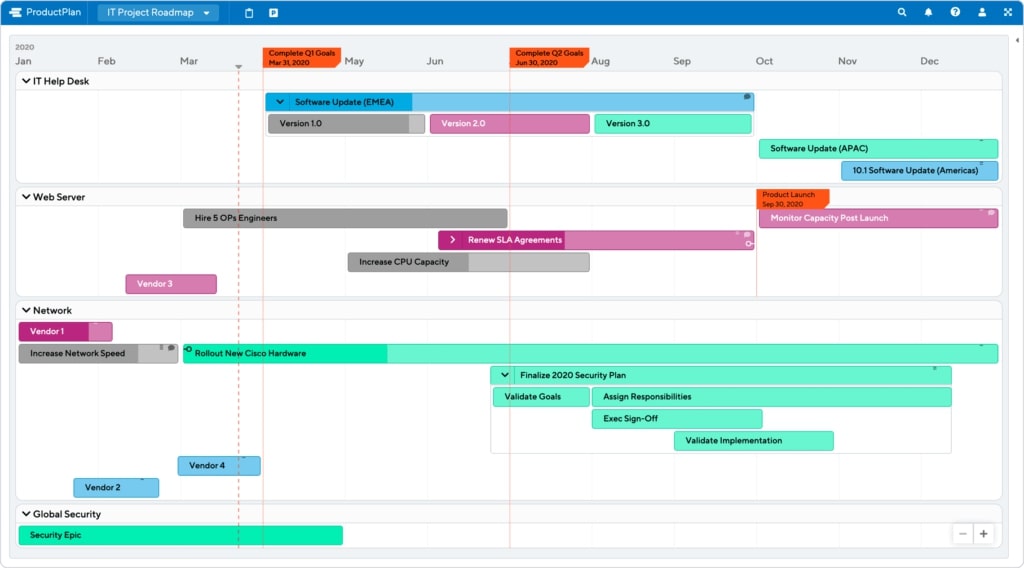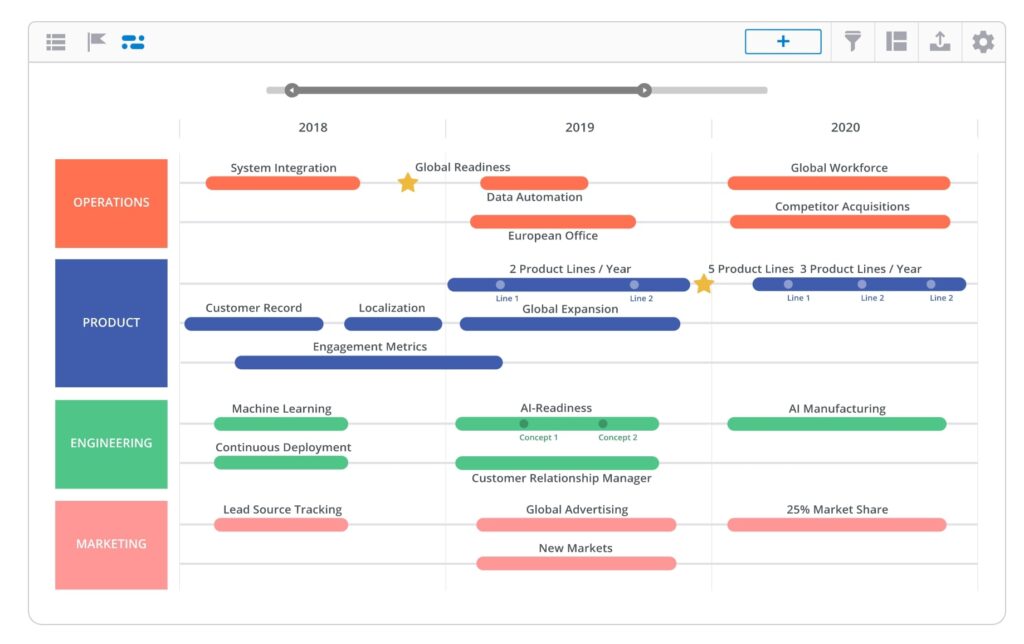Want to learn the verdict on the technical product manager vs program manager debate?
In software development and other industries, there’s some confusion regarding the roles of technical product managers vs program managers. Although these roles do have some similarities, they also have several key differences.
Let’s break down these major differences in detail.
To learn more via video, watch below. Otherwise, skip ahead.
Technical Product Manager Role
Technical product managers, also called tech PMs, are PMs who focus on the technical side of product management more than traditional PMs. standard overall. A tech PM’s title highlights their focus on technical products, like software or digital platforms.

Technical product managers also take part in product design or development.
Technical Product Manager Responsibilities
Among their other duties, technical product managers:
- Put together the right team members to complete product development
- Decide a product’s deadline
- Create timelines for those participating in product development
- Create a roadmap for the team to follow using management tools
- Outlines the overall goals for the developed product
- Decide what features to construct
- Deliver features that both delight customers and function the right way
- Collaborate with other teams, such as product or engineering teams
- Communicate with relevant stakeholders and supervisors, as well as customer support teams to answer questions
- Ensure that product development adheres to overall strategy needs and business goals

Credits: Product Plan
All of these responsibilities are crucial. Technical product management staff have leadership roles in many teams or organizations. Depending on their exact responsibilities, technical product managers oversee the development of multiple products at once or one at a time.
Program Manager Role
Program managers, also called project managers, are different from technical product managers. Instead of focusing on specific products, program managers focus on lateral product creation across large-scale projects. In such cases, program managers supervise multiple products at the same time.
Program managers handle how overall projects operate across a company. Their areas of supervision include the products that technical product managers develop. Looking at tech product manager vs program manager another way:
- Technical product managers oversee the design, development, and launch of specific technical products, such as software. Their focus is narrow and only on one product at a time unless otherwise directed.
- Program managers oversee how various products, including software, affect an organization and contribute to its goals. They assign projects to different product managers, assign personnel to different teams, and make sure that individual products do not harm overall project deadlines. Their focus is wide and considers multiple products worked on by several different teams.
Some program management professionals work as technical program managers. A tech program manager has more technical skills. These project managers know more about what a product team creates. Thus, they offer additional strategic guidance throughout the product development process.
Program Manager Responsibilities
The main responsibilities of a program manager include:
- Identifying interdependencies between products, strategic initiatives, and projects
- Assigning different teams for various projects depending on personnel allocation, individual workers’ skills, and other factors
- Investigating all possible ways in which a product or feature impacts a broader organization, company, or brand
- Collaborating with other departments, like marketing and HR, to ensure that a new product or project does not interfere with company objectives
- Working with hiring committees and HR teams to ensure that technical product managers have the staff necessary to complete assigned goals or develop products on time
- Identifying any potential risks that a product or project brings to an organization
- Building program schedules and ensuring that individuals are accountable when working toward progress benchmarks
- Justifying big expenditures or budget adjustments to stakeholders, superiors, and executives
- Reporting to executives about the status of assigned projects or products as well as analyzing customer feedback
Important Technical Product Manager Skills
Technical product managers leverage several important skills to do their jobs. These skills relate to high-level management and organizational practices. After all, technical product managers lead teams of many individuals and cross-coordinate between different departments in many cases.

Credits: Roadmunk
Some of the most important skills for technical product managers include:
- Interpersonal communication skills. Technical product managers must communicate with spokespeople, the public, superiors, external stakeholders, and anyone else necessary for product development and understanding.
- Visionary skills. Because technical product managers oversee product design and development from start to finish, they help come up with the technical features for the product. They look at data from customer surveys and other sources and decide what to build next within their companies. Product vision enables technical product managers to aim their teams at worthwhile creations
- Leadership skills: A technical product manager inspires their team members and act as team champions. They resolve interpersonal issues, motivate team members, and ensure that everyone adheres to company policies and methodologies for a streamlined, focused product creation process.
- Strategic business skills: Successful technical product managers know how to build products that benefit their companies or goals. They know how to look at important business KPIs or key performance indicators when deciding what to develop or build. Thus, they know how to perform market research, how to work with the marketing department, and how to leverage that information into existing programs
Technical product managers also understand the technology and products of their host organizations. They become experts in certain types of software architecture or coding practices.
When someone has a question about how to solve a technical problem or how to overcome a development hurdle, the technical product manager has the answer.
Important Program Manager Skills
Because of their lateral responsibilities, program managers need several vital skills that enable them to work across departments and keep track of multiple factors. Important skills program managers include:
- Organizational Skills. Program managers keep track of several product development cycles that run at the same time. They also track personnel schedules, budgetary limitations, and other factors that affect the status of a broader project or company
- Time Management Skills. Many program managers organize timesheets and schedules for people under their supervision. They assign deadlines for different products, which technical product managers must then meet
- Business Skills. Successful program managers understand what products and projects are most important for a company. They know which products to cut, which development lifecycles to concentrate on, and when projects are worthwhile for the company.
- Communication skills. As with technical product managers, program managers need to know how to talk to people and coordinate between teams. They do not oversee individuals in the same direct way as technical product managers. But they must still facilitate cross-department collaboration.
Program managers need strong leadership skills and other business skills that serve most executives and supervisors.
Technical Product Manager Salary
Technical product managers earn $124,000 per year on average. However, these professionals sometimes earn up to $360,000 per year. Lower-paid professionals earn as little as $46,000 per year.
Program Manager Salary
Program managers earn average salaries of $140,000 per year. Some program managers earn upwards of $180,000 a year, while others earn about $100,000 per year.
Technical Product Manager Career Path
Technical product managers become senior product managers after 3 to 5 years of successful work. They acquire additional responsibilities, collaborate with departments to drive product development goals, and may oversee other technical product managers underneath them. In doing so, they do not participate in the creation of specific products. Instead, they oversee the design and creation of multiple similar products, such as several software programs in the same batch.
Technical product managers also become product leaders. These individuals own particular products and help decide company directions for new product creation.
Program Manager Career Path
Program managers make their way into higher executive positions after accumulating some experience. They hold job titles including:
- Senior program manager
- Project manager
- Senior leader of program development
Regardless, many program managers receive promotions within their companies. They take on extra duties and oversee multiple projects at the same time.
Other program managers become management consultants. These individuals offer important advice to businesses and executives regarding product development, budgeting, personnel scheduling, and other business elements.
Program managers also progress into senior executive or leadership roles. They become chief information officers, CEOs, and other important company members.
Technical Product Manager vs Program Manager: Key Takeaways
Both technical product managers and program managers play key roles in the development, launch, and evolution of software products throughout the IT industry.
Technical product managers handle direct product design, development, and iteration. Program managers ensure that products and projects across a company proceed as planned. They also ensure that upcoming products contribute toward company’s strategic objectives.
